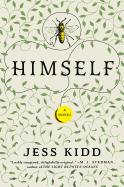
| Publisher: | Atria | |
| Genre: | Literary, Fiction | |
| ISBN: | 9781501145179 | |
| Pub Date: | March 2017 | |
| Price: | $26 |
| Fiction |
by Jess Kidd
Himself, Jess Kidd's debut novel, has an intricate, twisting, turning plot that weaves Irish mythology, magical realism and ghosts into a whodunit that is anything but typical of its genre. In 1970s Ireland, 26-year-old, bell-bottom-wearing Mahony, raised in a Dublin orphanage, pursues a life of petty theft. When he receives an anonymous letter suggesting that his mother did not give him up willingly, however, Mahony sets aside his roguish ways and heads to her small hometown of Mulderrig to find out what really happened all those years ago.
As Mahony's search for the truth unfolds, Himself draws on elements of Irish folklore in ways that make Kidd's novel feel both whimsical and ominous. "There's a lot of truth in folklore," insists Mahony--and given his ability to both see and speak with the dead, this assertion comes as no surprise. Though he's had the ability since he was young, he's avoided interacting with ghosts in Dublin. But no such thing is possible in Mulderrig, where the spirits of the town's dead flock to his side and whisper secrets to him--secrets the living would prefer to be left in the past. With the assistance of the apparitions and Mrs. Cauley, an aging stage actress self-described as "Miss Marple.... With balls," Mahony starts to piece together the secrets of this darkness in ways that lead him to his mother.
Kidd combines these elements of magic and mystery with moments of wry humor and heartfelt emotion. A tribute to the classic Irish art of storytelling, Himself is a delight from start to finish. --Kerry McHugh, blogger at Entomology of a Bookworm
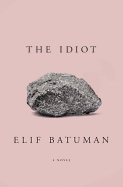
| Publisher: | Penguin Press | |
| Genre: | Contemporary Women, Literary, Coming of Age, Fiction | |
| ISBN: | 9781594205613 | |
| Pub Date: | March 2017 | |
| Price: | $27 |
| Fiction |
by Elif Batuman
When Selin Karada, the slightly off-plumb narrator of Elif Batuman's first novel, The Idiot, enters Harvard in the mid-'90s, e-mail is a curious new way to communicate and Facebook is just a Zuckerberg dream. The daughter of ambitious Turkish immigrants, Selin was an academic star in her New Jersey high school, but at Harvard "you were now a little fish in a big sea." She nurtures a romance by e-mail with Ivan, the older Hungarian from her Russian class, yet she knows herself well enough to recognize that "I was just an American teenager--the world's least interesting and dignified kind of person." Nonetheless, she soldiers on, taking a job teaching ESL to immigrants in Boston, reading classics like "Bleak House, which was as simultaneously absorbing and off-putting as someone else's incredibly long dream," and signing up for a summer travel program providing English skills to children in Hungarian villages--with the vague plan to see Ivan there and meet his family and friends.
Batuman first explored some of the themes of The Idiot in her well-regarded first book, The Possessed. While the titles of both clearly reflect her fascination with Dostoevsky, they are nonetheless rooted in the language and optimism of the United States. Describing a year of discovering oneself, The Idiot is half The Education of Henry Adams and half Innocents Abroad. Twain would have savored Selin's first international trip, and Adams surely would have applauded Selin's frustration with traditional learning. First footsteps into adulthood are often memorable. Taking them in Selin's shoes is an entertaining, intellectual journey not to be missed. --Bruce Jacobs, founding partner, Watermark Books & Cafe, Wichita, Kan.
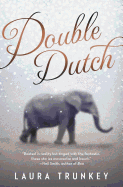
| Publisher: | Astoria/House of Anansi | |
| Genre: | Short Stories (single author), Fiction | |
| ISBN: | 9781770898776 | |
| Pub Date: | March 2017 | |
| Price: | $15.95 |
| Fiction |
by Laura Trunkey
The nine stories in Canadian author Laura Trunkey's debut collection, Double Dutch, are fantastical and eerie, filled with sentiments and descriptions that will haunt the reader. While the tales are fiction, some are based on facts, as in "Electrocuting the Elephant," which depicts the execution of Topsy the elephant at the hands of Thomas Edison. Trunkey expertly takes readers into the mindset of several of the men involved in the decision, as well as that of the pachyderm preparing for death in front of a crowd.
Death, miracles, a debilitating disease and dread of the unknown are some of the themes Trunkey explores in her unusual stories. In "Night Terror," a mother fears her son is the reincarnation of a Muslim terrorist when she hears him muttering Arabic in his sleep. In "Double Dutch," a man ponders the meaning of his life after spending so much of it as the double for former president Ronald Reagan. A grizzly bear attack changes the course of a couple's life together in "Ursus Arctos Horribilis." Ordinary people enter extraordinary circumstances, and their reactions betray the prejudices, beliefs and suspicions that they carry deep inside.
Trunkey's writing is raw. She approaches subjects obliquely, sending readers on unexpected tangents, but the effect leaves a deep impression of wonder and fascination, touched with a longing for the next collection from this talented writer. --Lee E. Cart, freelance writer and book reviewer
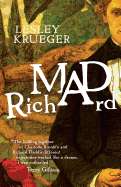
| Publisher: | ECW Press | |
| Genre: | General, Literary, Biographical, Fiction, Historical | |
| ISBN: | 9781770413566 | |
| Pub Date: | March 2017 | |
| Price: | $15.95 |
| Fiction |
by Lesley Krueger
Once a rising painter in Victorian England, Richard Dadd succumbed to madness, murdered his father and spent the rest of his days in asylums painting works that are now considered masterpieces. The main focus of Mad Richard by Canadian author Lesley Krueger (The Corner Garden) is Dadd's life before his break with reality. But Krueger ingeniously attaches Dadd's story to two of the most important writers of his age, Charlotte Brontë and Charles Dickens.
It's unclear how well Dickens and Dadd knew one another. They grew up in the same area of England for a short time (Dickens was older), and had similar social circles before Dadd's psychotic break. As for Brontë, Krueger arranges what is most likely a fictional meeting when Brontë visits Bedlam, where Dadd was incarcerated. Krueger uses this meeting to tie Brontë's and Dadd's lives together, running the story of Dadd's youth parallel to that of Brontë's final years. By portraying artists before and after their most significant achievements, Krueger is able to tease out a moving narrative of fame, beauty and what an artist owes his or her craft.
Dickens, of course, pops in and out of the story, mentioned here and there in both Brontë and Dadd's lives. But Krueger is also smart to give the man his due, showing how fame as England's greatest author came with the same struggles that Brontë and Dadd faced. Ultimately, Mad Richard is about how artists position themselves in relation to their work, and what they must give up to do so. --Noah Cruickshank, adult engagement manager, the Field Museum, Chicago, Ill.
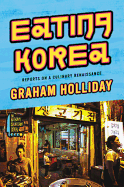
| Publisher: | Anthony Bourdain/Ecco | |
| Genre: | Cooking, Regional & Ethnic, Asian, Social Science, Customs & Traditions, Essays & Narratives | |
| ISBN: | 9780062400765 | |
| Pub Date: | March 2017 | |
| Price: | $26.99 |
| Food & Wine |
by Graham Holliday
Graham Holliday (Eating Viêt Nam) fell in love with Korean food during the two years in the mid-1990s that he spent as an English teacher in South Korea. In Eating Korea, he details his return 20 years later. Crisscrossing the country, he searches for the dishes that make its food distinctively and quintessentially Korean. What he finds, however, is an altered culinary landscape, gentrified and modernized in response to inevitable global influences.
What used to be considered a mainstay in the diet (kimchi) has largely fallen out of favor with the country's youth because of its fermented smell. Noting the increased availability of cheap food, Koreans' obsession with upward mobility and diminished interest in home cooking, Holliday travels to the farthest reaches to pry secrets from grand masters who uphold culinary traditions. In particular, he is determined to find dak galbi, the mixed chicken dish he ate for much of his initial stay in Korea: "a mess, a mistake that works... where everything Korean that's edible got dumped inside, turned upside down, rattled about, and thrown in your face."
No matter how many people Holliday asks, though, no one can define Korean cuisine to his satisfaction. He is left to rue--through nostalgia and sharp but witty critiques of modern Korean lifestyles--the loss of "the Korean food I had known that was born out of poverty and postwar solutions." Grudgingly, entertainingly, he persists, mulling over the implications of South Korea's culinary rebirth. --Nancy Powell, freelance writer and technical consultant
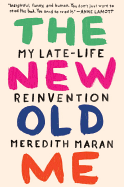
| Publisher: | Blue Rider | |
| Genre: | Biography & Autobiography, Women, Developmental, Adulthood & Aging, Psychology, Personal Memoirs | |
| ISBN: | 9780399574139 | |
| Pub Date: | March 2017 | |
| Price: | $27 |
| Biography & Memoir |
by Meredith Maran
With wit, hard-won insight and wisdom, memoirist Meredith Maran details how her life came apart when she was 60 years old and how, over a period of three years, she attempted to put it back together.
The story starts in California's Bay Area: Maran (Why We Write) packs up and leaves the home where she raised her two sons, wrote nine books, celebrated birthdays and shared 15 years with her wife, the love of her life. Harmony and peace had evaporated from the couple's relationship--along with the balance in Maran's bank account. When offered a copywriting job for a growing fashion company in Los Angeles, Maran took a leap and set off in search of a whole new life.
Change and reinvention are never easy, but Maran's story is told with plenty of comic relief. She laughs through her tears while enduring the culture shock of navigating life alone, and swallows her dread of working alongside "the kids"--svelte, confident, workout-obsessed employees, some of whom are young enough to be her grandchildren. Beyond work woes, she faces the challenge of finding a new home; old friend withdrawal and a creative search for new one; the perils of dating and death; and the sting of Botox and a Brazilian wax. Brisk, succinct prose infuses this entertaining memoir. It delivers a healing, hopeful message that will charm readers--especially women seeking to liberate themselves from the quicksand of aging by letting go of old dreams and insecurities. --Kathleen Gerard, blogger at Reading Between the Lines
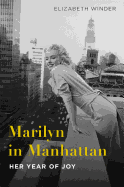
| Publisher: | Flatiron Books | |
| Genre: | Biography & Autobiography, Rich & Famous, Art, General, Popular Culture, Entertainment & Performing Arts | |
| ISBN: | 9781250064967 | |
| Pub Date: | March 2017 | |
| Price: | $27.99 |
| Biography & Memoir |
by Elizabeth Winder
Dozens of full-length biographies have been written about Marilyn Monroe (1926-1962), and most concentrate on her struggle with drugs, depression and anxiety. What makes Elizabeth Winder's Marilyn in Manhattan so refreshing and eye opening is her focus on the 14-month period when Monroe left Hollywood and moved to New York City. At the height of her career, in late 1954, Monroe moved east to train with Lee Strasberg and free herself from a long-term contract with 20th Century Fox that kept her underpaid and gave her no creative voice in her film projects. "For the first time she felt accepted," writes Winder. "Unlike glassy, judgmental Hollywood, New York embraced her quirks and creativity."
New York centered and revitalized the 28-year-old actress. Winder (Pain, Parties, Work, about Sylvia Plath) uncovers a gifted, intelligent and vulnerable woman who was far more complex than her sultry blonde bombshell image. She left her second husband, Joe DiMaggio, and took control of her life and career, founding her own production company with photographer Milton Greene and moving to Manhattan with Greene and his wife. She made friends with writers and intellectuals, studied with Method actors and refused all film offers. After a year away from Hollywood, she negotiated a new contract, won her dream film role (Bus Stop) and began a relationship with playwright Arthur Miller.
Winder writes with ease, mixing first-hand recollections from numerous biographies to create a vital and upbeat oral history of Monroe's emotional rebirth. Marilyn in Manhattan is an essential missing piece in her life story that enriches her legend. --Kevin Howell, independent reviewer and marketing consultant
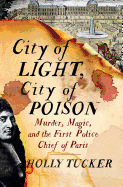
| Publisher: | W.W. Norton | |
| Genre: | Biography & Autobiography, True Crime, Europe, Law Enforcement, General, History, France, Murder | |
| ISBN: | 9780393239782 | |
| Pub Date: | March 2017 | |
| Price: | $26.95 |
| History |
by Holly Tucker
In City of Light, City of Poison, Holly Tucker (Blood Work) emphasizes that in the late 17th century, Paris was not an elegant and refined place to live. Violence and danger were found in its overcrowded streets and alleyways, where brass knuckles, knives and pistols were frequently used during brawls that broke out in public areas. So when one official lieutenant was murdered, and another civil magistrate found dead under suspicious circumstances, King Louis XIV went into action, appointing Nicolas de La Reynie as the first police chief and giving him the task of bringing order to the chaos.
Between April 1679 and July 1682, more than 400 people were questioned, 200 imprisoned and 30 executed by beheading, hanging or incineration for events known as the Affair of the Poisons. Tucker shares her four years of meticulous research through hundreds of handwritten documents to expose the truth about one of the more gruesome episodes in French history. Filled with the stories of the men and women involved in murder, attempted murder, Satanic rites and many infidelities among Paris nobility--including the king and his multiple mistresses--Tucker's exposition is a true detective story of the finest kind.
Interrogation scenes feature grisly details, but their intensity is offset by titillating details of Louis XIV's repeated romps with many a younger woman, and of La Reynie's relentless pursuit of the truth. For anyone interested in the darker side of the Sun King's reign, City of Light, City of Poison will not disappoint. --Lee E. Cart, freelance writer and book reviewer
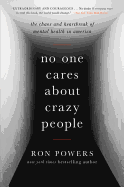
| Publisher: | Hachette | |
| Genre: | Psychology, Schizophrenia, Mental Health, Psychopathology | |
| ISBN: | 9780316341172 | |
| Pub Date: | March 2017 | |
| Price: | $28 |
| Starred | Health & Medicine |
by Ron Powers
In the opening line of No One Cares About Crazy People: The Chaos and Heartbreak of Mental Health in America, Ron Powers, Pulitzer Prize-winning journalist, author and co-author of nonfiction such as Mark Twain: A Life and Flags of Our Fathers, writes: "This is the book I promised myself I would never write." It is a hybrid, a nontraditional history of mental health care fused to an incredibly personal story about his two sons' struggles with schizophrenia. For his son Kevin, that struggle ended in suicide.
Powers doesn't attempt an encyclopedic history of mental illness and care in the United States, instead focusing on specific factors--trends, innovations, individuals, etc.--that played a role in creating a status quo wherein "too many of the mentally ill in our country live under conditions of atrocity." His story is one of repeated moral failings, from the doctors performing transorbital lobotomies to the greed-fueled depredations of Big Pharma. The title of the book is a quote from leaked government e-mails, repurposed into a damning allegation.
For the families of the mentally ill, of course, caring about "crazy people" is a necessity. In roughly alternating chapters, Powers allows us to watch his sons grow up, dealing with the challenges of incipient schizophrenia as well as tragic events that shape their young minds. The boys' interactions with the mental health care system give Powers a first-hand look into its failings, and in turn he shows the reader the devastating human consequences of society's indifference toward the mentally ill. --Hank Stephenson, bookseller, Flyleaf Books, Chapel Hill, N.C.
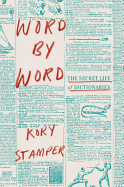
| Publisher: | Pantheon | |
| Genre: | Biography & Autobiography, Dictionaries, Lexicography, Reference, Personal Memoirs, General, Language Arts & Disciplines | |
| ISBN: | 9781101870945 | |
| Pub Date: | March 2017 | |
| Price: | $26.95 |
| Starred | Reference & Writing |
by Kory Stamper
Most people use a dictionary with little thought given to the genesis of definitions, or their maintenance. Merriam-Webster editor Kory Stamper pulls back the curtain in Word by Word: The Secret Life of Dictionaries, a paean to the craft of lexicography and a sometimes bemused exploration of the "Escher-esque logic of English."
Stamper neatly and wittily covers grammar, defining philosophy (recording language as people use it vs. guarding the purity of the language); "wrong" words, like irregardless and unravel; dialects (where marginalization of same can have dire results, as in the Trayvon Martin trial); the history of dictionaries; adding new words (with the standard resultant carping about the decline of civilization); revising (constant); etymology (many origin stories, like those for "posh," are false); dating ("OMG" can be traced back to 1917); pronunciation; and the sociolinguistic implications of "nude" (whose skin?).
Stamper obviously loves working with words, and has written a smart, sparkling and often hilarious valentine to the content and keepers of dictionaries. Whether describing the editorial table at Merriam-Webster (room for four editors to sit comfortably, or six "in introverted terror") or the reverence lexicographers have for "this gorgeous, lascivious" language, she shares her admiration and appreciation for the invisible craftspeople who not only define the recently added "face-palm," but also revise the verb "ghost" to match the current dating scene. In doing so, she deftly explains why "a living language made by fallible people will not be perfect, but it will be remarkable." --Marilyn Dahl, editor emerita, Shelf Awareness for Readers
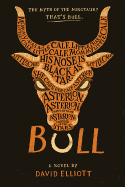
| Publisher: | Houghton Mifflin Harcourt | |
| Genre: | Classics, Black Comedy, Greek & Roman, Novels in Verse, Humorous, Legends, Myths, Fables, Poetry, Young Adult Fiction | |
| ISBN: | 9780544610606 | |
| Pub Date: | March 2017 | |
| Price: | $17.99 |
| Starred | Children's & Young Adult |
by David Elliott
Broadway's Hamilton meets Edith Hamilton in David Elliott's crackling YA debut, a rapid-fire verse reimagining of the Greek myth of the Minotaur.
The cast members take turns dropping rhymes to tell the story. Minos, the "all ego" monarch of Crete, offends Poseidon--"King of the Sea!.../ Old Earth-Shaker/ And one helluva troublemaker"--by keeping the prime white bull the god sends as a sign of Minos's right to rule, instead of sacrificing it as promised. Cursed by Poseidon, Minos's wife, Pasiphae, falls in love with the bull and gives birth to "my beautiful beautiful monster," who grows into the Minotaur. Sheltered and educated at Pasiphae's command, beloved by his sister Ariadne (who knows "who the monsters are"), the Minotaur is nonetheless stalked by a future that brings imprisonment in Daedalus's labyrinth and a young prince named Theseus who "[B]elieves his own hype."
Elliot, author of the picture books This Orq. (He Cave Boy) and In the Sea, revamps the famous monster as a gentle soul victimized by society and machinations beyond his control. His catchy, occasionally explicit verse begs for dramatic readings, and he imbues female characters in particular with a depth and sense of agency lacking in many retellings, while painting power players Poseidon, Minos and Theseus as the true bullies. Older teens will find this version of Greek mythology darker and edgier than they remember from their Percy Jackson phases but every bit as intense and enjoyable. Razor-sharp rhyme schemes and sly, vicious humor make Bull a bawdy yet sophisticated romp, a literary feast fit for the gods. --Jaclyn Fulwood, lead librarian at Del City Public Library, Okla.
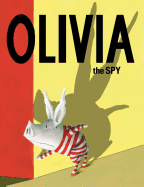
| Publisher: | Atheneum/S&S | |
| Genre: | Pigs, Humorous Stories, Animals, Holidays & Celebrations, Birthdays, Imagination & Play, Juvenile Fiction | |
| ISBN: | 9781481457958 | |
| Pub Date: | April 2017 | |
| Price: | $17.99 |
| Children's & Young Adult |
by Ian Falconer
Oh, Olivia, you maddening, marvelous piglet, how we love you.
This time around, Olivia, the everytoddler from Ian Falconer's Olivia series (Olivia and the Fairy Princess, etc.) develops a fascination with eavesdropping. After overhearing her mother talking about her latest mischief, Olivia thinks, "What ELSE is she saying about me? Maybe I should investigate." Of course she should. And when investigating, it's best to be sneaky, to "blend in," even if she's "always stood out." Disguising herself as a lamp, a piece of artwork, a zebra-print rug, the porcine spy listens in on conversations whenever and wherever she can. But the problem with eavesdropping is that one picks up "[p]artial truths and misinformation," which can make a person feel "[i]nsecure and suspicious," as Olivia learns--the hard way--when she catches her parents discussing an "institution" they'd like her to go to. Her helpful teacher gives her several definitions of this scary-sounding word, including "prison." Readers' hearts will go out to the contrite pig as she prepares for the "SPECIAL" place her mother says she's taking her, unaware that they're actually going to the Lincoln Center--a true New York City "institution"--to see a ballet!
Falconer's incorrigible and independent Olivia, portrayed in his trademark charcoal and gouache artwork, is beloved among a generation whose parents and grandparents were raised on the exploits of another New York scamp, Eloise. Olivia the Spy features the pig, with her propensity for costume changes, at her finest: confidently viewing the world through her own unique eyes. Eavesdropping? "Mommy, I would NEVER do that! I was SPYING!" --Emilie Coulter, freelance writer and editor
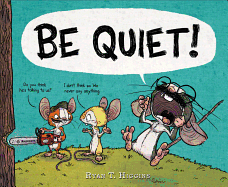
| Publisher: | Disney Hyperion | |
| Genre: | Humorous Stories, Animals, Mice, Hamsters, Guinea Pigs, etc., Books & Libraries, Juvenile Fiction | |
| ISBN: | 9781484731628 | |
| Pub Date: | April 2017 | |
| Price: | $17.99 |
| Children's & Young Adult |
by Ryan T. Higgins
Rupert the mouse has a sensitive artistic temperament, so when he decides to create a "visually stimulating" wordless picture book, he is not amused when his pals Thistle and Nibbs try to horn in on the creative process. He remonstrates them repeatedly for speaking: "Shhhh. Be QUIET. This book does not have words." Thistle is unfazed: "Wowee, a wordless book! Can I help?" he asks, then claps his paws over his mouth: "Oops--I'm talking! Eep! I'm TALKING about TALKING." "Every book needs a bear in it!" Nibbs chimes in. (On this page, fans of author Ryan T. Higgins's earlier books, Mother Bruce and Hotel Bruce, will recognize the titular scowling purple bear.) Bespectacled Rupert nearly goes mad with the constant chatter and unwelcome suggestions.
Clever hilarity and downright silliness abound, as when Thistle suggests including a "silent superhero" and Nibbs says, "We'll call him CAPTAIN QUIET and he could fight words!" The opposite page shows a comic book cover featuring a muscle-bound, blue-caped superhero with "SH" on his belt buckle and the words "Vocabulary Vigilante" over his head. By the end, the fussy would-be author is stomping his feet with vexation: "NO! NO! NO! No superheroes and no onomatopoeia, either!"
In the spirit of Michaela Muntean and Pascal Lemaitre's Do Not Open This Book and B.J. Novak's The Book with No Pictures, Higgins's Be Quiet! will delight readers who are beginning to realize that books don't just magically appear; they have authors and illustrators, and occasionally frustrating moments, behind them. --Emilie Coulter, freelance writer and editor